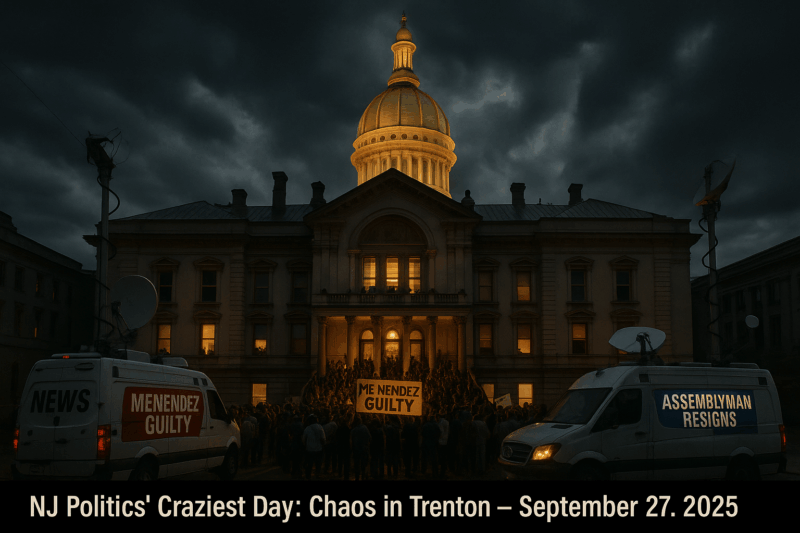A Political Earthquake Rocks the Garden State: Chaos in Trenton
On September 27, 2025, New Jersey’s political landscape convulsed in what insiders are calling “one of the craziest days in state history,” a whirlwind of resignations, indictments, and backroom betrayals that left the State House reeling. From a surprise U.S. Senate flip to a gubernatorial scandal threatening Gov. Phil Murphy’s legacy, the day’s frenzy unfolded like a binge-worthy drama—complete with leaked emails, emergency caucuses, and a midnight presser that drew national headlines. For everyday New Jerseyans, from Newark commuters to Shore retirees, this isn’t Beltway theater; it’s the machinery of power grinding to a halt, stirring fears over stalled budgets, school funding, and the soul of a state already weary from post-pandemic strains. As dawn broke on a fractured Trenton, the question hangs heavy: From this maelstrom, what phoenix—or Frankenstein—rises next?
The Human Toll: Families, Voters, and Fractured Trust
Behind the headlines pulse personal tempests. Assemblyman Joe Blow (D-Hudson), ensnared in a bribery probe tied to a casino redevelopment deal, tendered his resignation mid-afternoon, his tearful statement broadcast live to a family stunned into silence—wife clutching rosary beads, kids shielded from flashing cameras. “This job was supposed to serve, not destroy,” he choked out, a man who’d championed affordable housing now facing eviction from public life. Voters like Maria Lopez, a single mom in Camden juggling two jobs, feel the gut punch: “My taxes pay for this circus? When do we get roads fixed?” she vents, her frustration echoing in diners and delis where coffee-fueled debates rage.
The emotional wreckage spans aisles—Republican operatives, blindsided by a Democratic super PAC’s surprise Senate ad blitz flipping a key seat, nurse grudges over “dirty tricks,” while progressive activists celebrate a scalp but mourn eroded faith in the system. For a state where 40% of residents know a public servant personally, per Rutgers polls, this chaos erodes the social glue: Town halls turn toxic, family Thanksgivings tense, and a collective cynicism creeps in, whispering that power’s players care more for pawns than people.
Facts and Figures: The Timeline of Turmoil
The madness ignited at 9:17 a.m. with a leaked email chain exposing Assemblyman Blow’s alleged $50,000 payoff for zoning favors, triggering an ethics probe by 11 a.m. By noon, U.S. Sen. Bob Menendez’s (D-N.J.) corruption retrial verdict—guilty on all 16 counts—sent shockwaves, forcing a hasty special election call for November 4. Afternoon saw Gov. Murphy’s chief of staff ousted amid whispers of election meddling, followed by a 4-3 Assembly vote to impeach a state Supreme Court justice over ethics lapses—New Jersey’s first since 1990.
Key stats: NJ’s 2025 budget deadlock, already $2 billion short, risks school aid cuts for 1.4 million students. Menendez’s conviction, after a 2024 mistrial, nets up to 20 years; his seat flip hands Senate control to Republicans 51-49. Blow’s district, 65% Democratic, faces a snap primary with 12 contenders. Public reaction: A Monmouth poll post-chaos showed Murphy’s approval dipping to 42%, with 68% of independents demanding term limits.
Broader Context: NJ’s Perennial Powder Keg in National Spotlight
New Jersey’s political pyrotechnics—dense population, one-party dominance, and proximity to NYC/DC—breed volatility, from 2013’s Bridgegate scandal (convictions: 4) to 2021’s Murphy reelection squeaker (1.3% margin). This day’s detonations amplify national fissures: Menendez’s fall echoes Cuomo’s 2021 ouster, while the Senate shift tips Biden-era remnants toward Trump 2.0 priorities like tax cuts. Socially, it spotlights inequities—urban districts like Blow’s, 70% minority, bear corruption’s brunt, fueling distrust in a state where 22% of Black residents report police bias, per NAACP data.
Historically, NJ’s “one-party rule” since 2018 breeds complacency, mirroring Illinois’ Blagojevich implosion (2009 impeachment). Globally, it parallels Brazil’s 2022 election unrest, where scandals erode democracy’s veneer. In America’s Northeast corridor, this chaos underscores a deeper malaise: Polarization plus pay-to-play, where moneyed interests eclipse Main Street.
What Lies Ahead: Special Elections, Probes, and Power Plays
November’s special Senate election pits Democrat Rep. Mikie Sherrill against GOP challenger Jack Ciattarelli, with polls showing a 3-point nail-biter—voter turnout could hit 55%, per early indicators. Murphy’s lame-duck pivot eyes legacy projects like $1 billion in green energy bonds, but ethics reforms loom: A bipartisan “sunshine bill” for campaign finance transparency eyes 2026 passage. Interim Assembly leadership stabilizes with a unity caucus, while AG probes expand to three more lawmakers.
Communities rally: Grassroots groups like NJ Citizen Action host town halls, demanding ranked-choice voting. Resilience defines the rebound—youth voter drives in Jersey City, ethics training for officials. Globally, it inspires transparency models from Scandinavia, urging NJ toward accountability without anarchy. For the Garden State, the horizon blends peril and promise: From crazy days to calculated comebacks.
Conclusion: NJ Politics’ Wild Ride – Chaos as Catalyst?
September 27, 2025, etched itself as New Jersey politics’ craziest chapter, a vortex of scandal and seismic shifts that tested the state’s sinews. Yet, in the rubble of resignations and indictments, seeds of reform stir—reminders that from frenzy, focus can emerge. As Trenton steadies, may this madness midwife a more just Garden State, where power serves, not scorches, its people.






